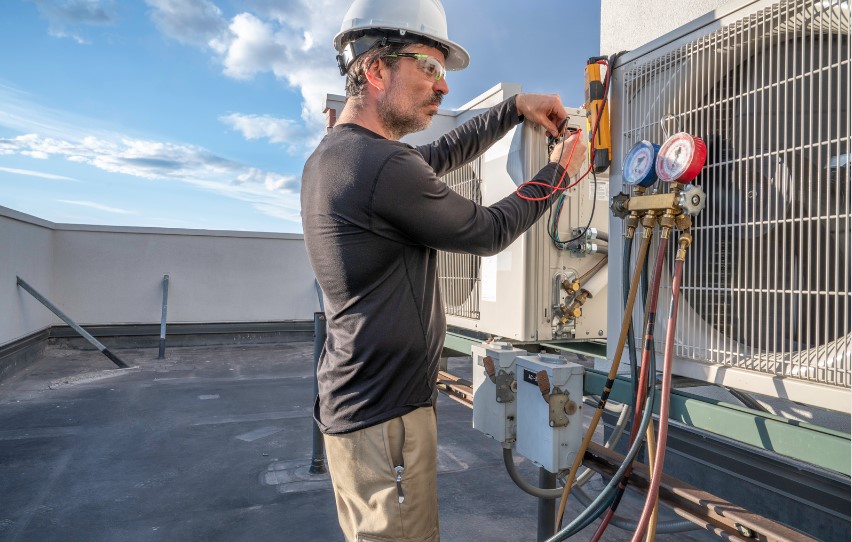Busting Common HVAC Misconceptions: What One Need to Know

Regarding heating, ventilation, and air conditioning, false information can lead to expensive errors and uncomfortable living conditions. Homeowners often rely on common myths that can cloud their judgment about HVAC systems and maintenance. Grasping the facts behind these myths is crucial for guaranteeing your HVAC system functions effectively, remains dependable, and extends its lifespan.
In this article, we will dispel some of the widely held HVAC myths that circulate in homes and online. Ranging from servicing frequency to the role of smart thermostats, we’ll cover the facts you need to know to make well-informed choices about your HVAC system. Whether you’re considering a new installation or just looking to improve your current setup, this guide will clarify essential aspects of HVAC maintenance, efficiency, and overall performance.
Essential HVAC Maintenance Guidelines
Routine maintenance of your HVAC system is vital for securing efficiency and longevity. One of the most aspects is replacing your air filters regularly. Clogged filters limit airflow, causing your system work harder and potentially resulting in costly repairs. It is advised to check your filters every month and swap out them every three months, or more frequently if you have pets or allergies.
Next, book annual professional inspections for your HVAC system. During these assessments, a technician can spot and fix issues before they escalate into major problems. This preventive approach not only prolongs the lifespan of your system but also ensures it runs efficiently, cutting you money on energy bills. Remember that many manufacturers necessitate regular maintenance to keep warranties in effect.

Another key maintenance tip is to keep the outdoor unit clear of debris. Leaves, dirt, and vegetation can block flow and decrease efficiency. Make sure to trim any plants that may encroach on the unit and maintain the area around it regularly. Maintaining ample space around your HVAC system will help it perform optimally and reduce the risk of mechanical failures.
Identifying Heating, Ventilation, and Air Conditioning Unit Problems
Being vigilant to the operation of your HVAC system can avoid minor problems from growing into costly repairs. A of the first signs that something might be wrong is irregular temperatures throughout your home. If certain rooms are hotter or cooler than others, this discrepancy could signal problems with air circulation, ductwork, or the unit itself. Additionally, if your system is striving to maintain the set temperature, it may be necessary to investigate further.
A different common sign of HVAC problems is strange noises. Noises such as grinding, screeching, or clanging can imply that components are wearing out or have become misaligned. These noises should not be ignored, as they frequently signal the necessity for prompt service. Furthermore, if you notice a sudden rise in your utility bills without a corresponding rise in consumption, this could indicate that your HVAC system is functioning harder than it should, possibly due to malfunctions.
Lastly, pay attention to any shifts in indoor air condition. If you start to experience more dust buildup, lingering odors, or a increase in allergy symptoms, these are signs that your HVAC system may not be functioning efficiently. Visit this link , duct leaks, or inadequate ventilation can contribute to these issues. Regular maintenance and timely attention to these signals can ensure ensure that your HVAC system operates efficiently and provides a healthy indoor environment.
Debunking HVAC Misconceptions
One widespread myth is that every HVAC systems are identical, leading homeowners to opt for systems ignoring their unique needs. Diverse homes have distinct heating and cooling needs according to size, layout, and location. Selecting the appropriate HVAC system for your home involves more than brand or price; it necessitates understanding the specific requirements of your space to guarantee energy efficiency and maximum performance.
A further, misconception is that after an HVAC system is installed, it demands little to no maintenance. In reality, regular servicing is crucial for lengthening the lifespan of the system and ensuring its efficiency. Residents often underestimate the importance of annual HVAC tune-ups and filter changes, which help mitigate frequent problems and enhance indoor air quality. Neglecting these practices can lead to financially burdensome repairs and diminished system performance.
In conclusion, a lot of people believe that modern HVAC systems are protected against problems simply because they are new. While recent units are designed with superior technology and efficiency ratings, they are not faultless. Issues can still arise, and homeowners should remain vigilant for clues that their HVAC system needs attention. Understanding frequent HVAC problems and knowing when to decide to repair versus replace can save you time and money in the long run.
